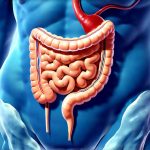Digestive fatigue isn’t simply about feeling tired after eating; it’s a pervasive sense of exhaustion linked directly to the digestive process itself. It goes beyond occasional bloating or discomfort, manifesting as a draining tiredness that can last for hours – even days – following meals. This fatigue often disrupts daily life, impacting energy levels, concentration, and overall well-being. While many attribute this feeling to dietary choices or overeating, emerging research points toward the significant role of gut micro-infections and low-grade pathogens as underlying contributors, frequently overlooked in traditional digestive assessments.
The conventional understanding of digestive issues often focuses on conditions like irritable bowel syndrome (IBS) or food sensitivities. However, these diagnoses don’t always fully explain the profound fatigue some individuals experience. Increasingly, scientists are recognizing that even subtle imbalances within the gut microbiome – specifically, persistent low-level infections and the resulting inflammatory responses – can drain energy reserves and significantly impair digestive function. These aren’t necessarily dramatic, acute illnesses; rather, they’re often chronic, smoldering issues that contribute to a constant state of metabolic stress, leaving individuals feeling depleted and overwhelmed even after seemingly healthy meals. Understanding the complex relationship between gut health and overall wellbeing is crucial, as detailed in role of gut microbiota for iron absorption and fatigue prevention.
Understanding Gut Micro-Infections & Low-Grade Pathogens
The gut microbiome is an incredibly complex ecosystem containing trillions of microorganisms – bacteria, viruses, fungi, and archaea. While many are beneficial, supporting digestion and immunity, others can be problematic, especially when their numbers become imbalanced. Low-grade pathogens aren’t necessarily virulent or disease-causing in the traditional sense. Instead, they represent opportunistic microbes that take hold in a compromised gut environment. These might include certain strains of bacteria like Klebsiella pneumoniae, Candida species (fungi), or even specific viruses that can persist without causing obvious acute symptoms but trigger chronic inflammation. – A key factor is often reduced stomach acid production which allows pathogens to survive passage into the small and large intestine.
– Dysbiosis – an imbalance in the gut microbiome – creates a fertile ground for these opportunistic microbes, weakening the body’s natural defenses and allowing them to proliferate.
– Chronic stress, poor dietary habits (high sugar, processed foods), and antibiotic use are all significant contributors to dysbiosis, increasing susceptibility to micro-infections. This disruption can have far reaching consequences as explored in gut flora.
The impact of these infections isn’t limited to local gut symptoms. The gut is intimately connected to the brain via the gut-brain axis, a bidirectional communication network. Chronic inflammation in the gut can trigger systemic inflammatory responses, affecting neurotransmitter production and impacting energy metabolism. This explains why digestive fatigue often manifests as mental fog, decreased motivation, and overall tiredness. Furthermore, persistent infections require the immune system to remain constantly activated, diverting energy away from other vital functions, resulting in a feeling of profound exhaustion even after adequate sleep. The body is essentially working overtime just to manage these hidden microbial imbalances. This constant state can impact cognitive balance.
Digestive Fatigue: How Pathogens Drain Your Energy
The link between gut pathogens and digestive fatigue lies in several key mechanisms. Firstly, the immune system’s response to infection requires substantial energy expenditure. When your body is constantly battling low-grade infections, it’s diverting resources away from processes like tissue repair, nutrient absorption, and cellular energy production. This leads to a state of mitochondrial dysfunction – where the powerhouses of cells (mitochondria) are unable to efficiently generate ATP (the body’s primary energy currency). – Pathogens can also directly interfere with nutrient absorption, hindering the uptake of essential vitamins and minerals crucial for energy metabolism.
– Inflammation disrupts gut motility, leading to constipation or diarrhea, both of which further exacerbate fatigue by impairing nutrient assimilation and increasing metabolic demands on the digestive system.
Secondly, many pathogens produce toxins that contribute to systemic inflammation and neuroinflammation (inflammation in the brain). These toxins can disrupt the intestinal barrier – often referred to as “leaky gut” – allowing undigested food particles and microbial components to enter the bloodstream, triggering further immune activation and inflammatory responses. This creates a vicious cycle where inflammation perpetuates infection and fatigue. Lastly, some pathogens produce compounds that directly inhibit digestive enzymes, impairing the breakdown of food and leading to malabsorption and increased bloating, contributing to feelings of fullness and lethargy after meals. Supporting gut health through dietary choices, such as incorporating polyphenols, can play a significant role in reducing inflammation.
Identifying Potential Gut Micro-Infections
Diagnosing gut micro-infections can be challenging because conventional testing often focuses on identifying acute infections rather than chronic, low-grade imbalances. However, several advanced tests can provide valuable insights:
- Comprehensive Stool Analysis: This test analyzes the composition of the gut microbiome, identifying dysbiosis, opportunistic pathogens, and markers of inflammation (like calprotectin). It’s a cornerstone for understanding the state of your gut ecosystem.
- Organic Acids Test (OAT): OAT measures levels of organic acids produced by various microorganisms in the gut. Elevated levels can indicate specific infections or metabolic imbalances related to dysbiosis.
- Breath Tests: Specifically, lactulose and SIBO breath tests can identify Small Intestinal Bacterial Overgrowth (SIBO), a common condition where bacteria from the large intestine migrate into the small intestine, leading to fermentation and digestive symptoms.
Beyond testing, certain symptoms can raise suspicion of gut micro-infections. These include: – Persistent bloating or gas that doesn’t respond to dietary changes.
– Brain fog, difficulty concentrating, or memory problems.
– Chronic fatigue that worsens after meals.
– Food sensitivities or intolerances that seem to change over time.
– Skin issues like eczema or psoriasis. The impact of the gut microbiome on skin health is highlighted in gut bacteria.
Supporting Gut Health & Reducing Pathogen Load
Addressing digestive fatigue requires a multi-faceted approach focused on restoring gut health and reducing the pathogen load. This isn’t about quick fixes; it’s about creating a sustainable lifestyle that supports a balanced microbiome. – Dietary Modifications: Eliminating sugar, processed foods, and inflammatory fats is crucial. Focus on whole, unprocessed foods rich in fiber, prebiotics (foods that feed beneficial bacteria), and probiotics (live microorganisms).
– Targeted Supplementation: Depending on the specific pathogens identified through testing, supplements like berberine, oregano oil, or caprylic acid can help inhibit microbial growth. However, these should always be used under the guidance of a healthcare professional. Probiotics can also offer support, especially when traveling.
Restoring Gut Barrier Function & Reducing Inflammation
A critical component is restoring gut barrier integrity to prevent further inflammation and systemic leakage. – L-Glutamine: This amino acid plays a vital role in repairing the intestinal lining.
– Zinc Carnosine: Supports healing of the gut mucosa and reduces inflammation.
– Omega-3 Fatty Acids: Possess anti-inflammatory properties that can help dampen the immune response.
Managing stress is equally important, as chronic stress weakens the immune system and disrupts gut function. Techniques like meditation, yoga, or deep breathing exercises can help reduce cortisol levels and promote a healthier gut environment. Finally, optimizing sleep quality is essential for allowing the body to repair and regenerate during rest. Addressing digestive fatigue isn’t always straightforward, but by understanding the role of gut micro-infections and adopting a holistic approach to gut health, individuals can reclaim their energy and improve their overall well-being. Furthermore, recognizing the connection between the gut microbiome and aspects like mental flexibility is crucial for holistic wellbeing.


















